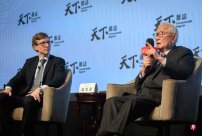(Singapore News) The U.S. government announced last week that restrictions on American people's semiconductor companies in mainland China.A survey found that at least 43 Americans or permanent residents served as chairman, president, vice president, etc. at 16 Chinese listed semiconductor companies.Today, these people must make difficult choices between U.S. nationality and Chinese high -paying work.
According to the Wall Street Journal, these 43 people have worked in Silicon Valley chip chip manufacturers or semiconductor equipment companies for many years before they move to the Chinese chip industry.Among them, some people went to work under the recruitment of the "Thousand Talents Plan" in China in 2008.
The U.S. government issued a new ban in early October to severely control the export of advanced chips, technology and equipment to China, and it is also rare to prohibit the "R & D or production" of US citizens and green card holders support its advanced chips in Chinese companies.American citizens or permanent residents who violate the ban will be canceled.
Cao Jiarong analyzed by the "control risk" analyst of the risk consultant company, for the executives of these Chinese companies, the new ban may make them choose from work with American citizens or permanent residence status.
New regulations require all US personnel to apply for permission to work in the Chinese chip industry.
Yin Zhiyao, the founder and chairman of China ’s largest chip manufacturing equipment, the founder and chairman of the Sino -Micro Semiconductor Equipment Company, is a typical example.
According to the company's latest annual report, Yin Zhiyao and six current senior managers and core researchers are American citizens.He has worked in Silicon Valley for nearly 20 years and has worked in American companies such as Intel and Application Materials Company.
The latest annual report of Beijing Zhaoyi Innovation Company, chip design company, also shows that Deputy Chairman Shu Qingming and director Cheng Taiyi both hold American passports.
Some analysts pointed out that the United States restricts the Chinese chip industry from both ends of talents and the market, and aims to slow down China's science and technology development.However, Hutch, a partner of Bain's strategic consultant, believes that although restrictions can slow down the development of the Chinese chip industry, it is not enough to stifle the Chinese chip industry.


